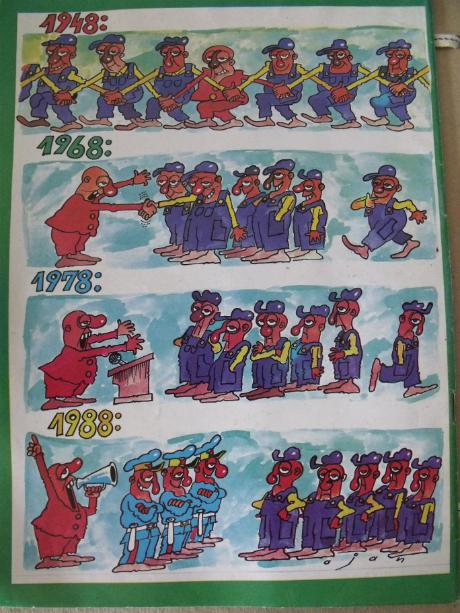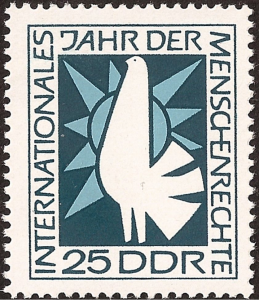Join us for our conference on the “Other Globalisers”, Exeter 6-7 July 2017
Posted on 23 February, 2017 in1989 after 1989 East Asia Eastern Europe Economy Globalisation Latin America Neoliberalism Post Socialism Rethinking 1989 Socialism South Africa Soviet Union

The Other Globalisers: How the Socialist and the Non-Aligned World Shaped the Rise of Post-War Economic Globalisation
Location: Exeter University, UK
Date: 6-7 July 2017
Abstract Deadline: 18 March 2017
Papers are now invited for our exciting conference addressing how the socialist and non-aligned world shaped the rise of post-war economic globalisation. This conference is the second in a series of events exploring how processes and practices that emerged from the socialist world shaped the re-globalised world of our times.
CONFERENCE SYNOPSIS
In the wake of the Second World War, the world economy began to ‘reglobalise’ – following the disintegrative processes of the interwar period. This story has most often been told as the final triumph of a neoliberal international order led by the West. Recent research, however, suggests that the creation of our modern interconnected world was not driven solely by the forces of Western capitalism, nor was it the only model of global economic interdependence that arose in the second half of the twentieth century. This conference aims to rethink the histories of postwar globalisation by focusing on the socialist and non-aligned world, whose roles in the rise of an economically interconnected world have received substantially less attention.
This conference aspires to address a wide variety of processes, practices and projects – such as efforts to create alternative systems of international trade, new business practices, through to theoretical conceptualisations of economic interconnectedness – and examine a broad range of actors, such as e.g. governments, experts, international institutions, and business ventures. It will also explore whether such initiatives were alternative at all: as recent research has suggested, actors from these worlds could be contributors to the emerging neoliberal consensus, as well as to other forms of regional economy and global trade that survive to this day. We also hope to encourage an interdisciplinary dialogue between scholars using different approaches to global interconnectedness, and/or working on a variety of regions (e.g. Latin America, Africa, Asia, Eastern Europe and the Soviet Union).
Abstracts of 300-500 words, together with an accompanying short CV should be submitted to Natalie Taylor (N.H.Taylor@exeter.ac.uk) by 18 March 2017.
The selected participants will be notified by the end of March 2017.
Funding opportunities for travel and accommodation are available, but we ask that potential contributors also explore funding opportunities at their home institutions.
This event is kindly supported by Exeter University’s Leverhulme Trust-funded project 1989 after 1989: Rethinking the Fall of State Socialism in Global Perspective.
The full call for papers is available on our conference page
→ Download the Call for Papers The Other Globalisers
Post-Doctoral Positions with PanEur1970s at the European University Institute
Posted on 3 May, 2016 inEastern Europe GDR Post Socialism Socialism
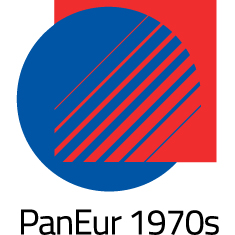
Two Research Associate positions are currently available with the PanEur1970s – Looking West: the European Socialist regimes facing pan-European cooperation and the European Community, based at the European University Institute. This five year project is investigating the European Socialist regimes’ expectations and predicaments vis-à-vis the opening of a space of pan-European cooperation in the long 1970s.
Research Associate Vacancy: GDR and European cooperation in the 1970s (24 months)
Applications are now open for a research associate to study these debates in the German Democratic Republic (East Germany) by exploring and analysing archival as well as published sources.
More specifically, s/he will do research on East Germany’s socialist elites’ views, policies, and ideas on the processes of European cooperation and integration in the 1970s.
The position will be for 24 months, starting from October 2016.
The appointed candidate will receive a monthly net salary of approximately 2500 EUR depending on qualifications and allowances (household allowance, expatriation allowance, travel allowance, medical insurance, and dependents’ allowances, if applicable).
Funding for research missions and participation to international conferences will also be provided.
The candidate will have a PhD in History (preferably international or economic history) or in a closely related discipline, as well as research experience on GDR’s archival records.
S/he will be fluent in German and have good command of English.
Knowledge of other European languages may constitute an advantage but is not required.
Research Associate Vacancy: Bulgaria and European cooperation in the 1970s (24 months)
Applications are now open for a Research Associate to study these debates in Bulgaria by exploring and analysing archival as well as published sources.
More specifically, s/he will do research on Bulgaria’s socialist elites’ views, policies, and ideas on the processes of European cooperation and integration in the 1970s.
The position will be for 24 months, starting from October 2016.
The appointed candidate will receive a monthly net salary of approximately 2500 EUR depending on qualifications and allowances (household allowance, expatriation allowance, travel allowance, medical insurance, and dependents’ allowances, if applicable).
Funding for research missions and participation to international conferences will also be provided.
The candidate will have a PhD in History (preferably international or economic history) or in a closely related discipline, as well as research experience on Bulgaria’s archival records.
S/he will be fluent in Bulgarian and have good command of English.
Knowledge of other European languages may constitute an advantage but is not required.
The deadline to submit applications for both posts is 31 May 2016.
More information and details of how to apply can be found on the PanEur1970s website:
GDR and European cooperation post
Bulgaria and European cooperation post
[Top]Human Rights after 1945 in the Socialist and Post-Socialist World Conference Programme
Posted on 29 February, 2016 in1989 1989 after 1989 Cold War Globalisation Human Rights Socialism

March 3-5, 2016
German Historical Institute Warsaw
Conference Room, 3rd Floor
Organizers:
German Historical Institute Warsaw
1989 after 1989: Rethinking the Fall of State Socialism in Global Perspective
Georg-August University of Göttingen
Synopsis
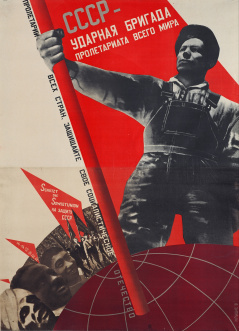 As both human rights and globalization have emerged as dynamic fields of historical and sociological research, the “socialist world” is relegated to a supporting role in the triumph of Western capitalism and liberal democracy. The aim of this conference is to question established narratives that have ignored or downplayed the role of socialist ideas, practice, and experts—be they state officials, loyal intellectuals or dissident activists — in the development of international human rights ideas, discourses, and systems in the post-war era. With a geographic scope that covers the Soviet Union, the Eastern Bloc, Yugoslavia and China, we hope to show that the socialist world did not just react passively to Western human rights politics, but was a vital participant in the production of global human rights with legacies that continued past the revolutions of 1989. By examining the socialist contribution to the evolution of human rights, we hope to contribute to revising standard narratives of globalization that focus exclusively on the perceived winners of these processes.
As both human rights and globalization have emerged as dynamic fields of historical and sociological research, the “socialist world” is relegated to a supporting role in the triumph of Western capitalism and liberal democracy. The aim of this conference is to question established narratives that have ignored or downplayed the role of socialist ideas, practice, and experts—be they state officials, loyal intellectuals or dissident activists — in the development of international human rights ideas, discourses, and systems in the post-war era. With a geographic scope that covers the Soviet Union, the Eastern Bloc, Yugoslavia and China, we hope to show that the socialist world did not just react passively to Western human rights politics, but was a vital participant in the production of global human rights with legacies that continued past the revolutions of 1989. By examining the socialist contribution to the evolution of human rights, we hope to contribute to revising standard narratives of globalization that focus exclusively on the perceived winners of these processes.
Conference Programme
Thursday, 3 March 2016
14:00-14:30
Welcoming Address
Ruth LEISEROWITZ (German Historical Institute Warsaw)
14:30-15:30
Introductory Panel: State Socialism, Human Rights and Globalization: In Search of a New Narrative
Hella DIETZ (Georg-August University of Göttingen)
Ned RICHARDSON-LITTLE (University of Exeter)
Robert BRIER (London School of Economics)
15:30-16:00 Coffee break
16:00-18:00
Panel 1: Defining Human Rights Internationally
Steven JENSEN (Danish Institute for Human Rights)
Defining the Social in the Global: Social Rights, UN Diplomacy and the Emergence of International Non-Discrimination Norms and Politics, 1950-1960
Alexander OSIPOV (European Centre for Minority Issues)
The Soviet Union’s Involvement in the Establishment of the European Minority Rights Regime
Discussant: Arnd BAUERKÄMPER (Free University Berlin)
19:00 Conference Dinner
Friday, 4 March 2016
09:00-11:00
Panel 2: State-Socialist Conceptions of Rights and Human Rights
Jennifer ALTEHENGER (King’s College London)
Rights, Not Human Rights: Communist China’s National Constitution Discussion, 1954
Michal KOPEČEK (Institute for Contemporary History, Prague and Charles University, Prague)
Socialist Conceptions of Human Rights and its Dissident Critique
Todor HRISTOV (University of Sofia)
Rights to Weapons: Human Rights as a Resource in Workplace Conflicts in Late Socialist Bulgaria
Discussant: Paul BETTS (Oxford University)
11:00-11:30 Coffee Break
11:30-13:00
Panel 3: Tolerance, Difference, and Rights under Socialism
Ivan SABLIN (University of Heidelberg)
Illusive Tolerance: Buddhism in the Late Soviet State
Zhuoyi WEN (Hong Kong Institute of Education)
Contesting Cultural Rights in Post-socialist China
Discussant: tba
13:00-14:30 Lunch break
14:30-16:00
Panel 4: Human Rights as Socialist Foreign Policy
Sebastian GEHRIG (Oxford University)
The Fifth Column of the Third World? The East German Quest for International Recognition through UN Rights Discourses
Jens BOYSEN (German Historical Institute Warsaw)
Polish Engagement in the United Nations as a Tool for Justifying Communist Rule in Poland and Gaining Leeway in the Warsaw Pact
Discussant: Robert BRIER
(London School of Economics)
16:00-16:30 Coffee Break
16:30-18:00
Panel 5: Transnational Movements and Flows
Christie MIEDEMA (University of Amsterdam)
Negotiating Space for International Human Rights Activism: Amnesty International in Eastern Europe before 1989
Rósa MAGNÚSDÓTTIR (University of Aarhus)
Soviet-American Intermarriage: Transnational Love and the Cold War
Discussant: James MARK (University of Exeter)
19:00 Dinner for the conference participants
Saturday, 5 March 2016
9:00-11:00
Panel 6: Dissent and Human Rights
Simone BELLEZZA (University of Eastern Piedmont)
The Right to Be Different: Ukrainian Dissent and the Struggle Against a Global Consumerist Cultural Standardization
Hermann AUBIÉ (University of Turku)
Between Loyalty and Dissent: Revisiting the History of Human Rights in China Through the Discourse of Chinese Intellectuals and Dissidents
Zsófi a LÓRÁND (European University Institute, Florence)
Feminist Dissent, Activism for the Elimination of Violence against Women, and the Human Rights Discourse in Yugoslavia in the 1970s-1980s
Discussant: Celia DONERT (University of Liverpool)
11:00-11:30 Coffee Break
11:30-13:00
Concluding Panel: The Place of State Socialist Societies in the Global History of Human Rights
Paul BETTS (Oxford University)
James MARK (University of Exeter)
Celia DONERT (University of Liverpool)
Call for Papers: (Re)Thinking Yugoslav Internationalism – Cold War Global Entanglements and their Legacies
Posted on 14 December, 2015 in1989 after 1989 Cold War End of Yugoslavia Globalisation Rethinking 1989 Socialism

Graz, Austria
Centre for Southeast European Studies, University of Graz and the University of Exeter
30 September – 1 October 2016
Call for Papers Deadline: 28 February 2016
(Re)Thinking Yugoslav Internationalism – Cold War Global Entanglements and their Legacies
For more than forty years, Yugoslavia was one of the most internationalist and outward looking of all socialist countries in Europe, playing leading roles in various trans-national initiatives – principally as central participant within the Non-Aligned Movement – that sought to remake existing geopolitical hierarchies and rethink international relations. Both moral and pragmatic motives often overlapped in its efforts to enhance cooperation between developing nations, propagate peaceful coexistence in a divided world and pioneer a specific non-orthodox form of socialism.
Although the disintegration of socialist Yugoslavia has received extensive treatment across a range of disciplines, the end of Yugoslavia’s global role and the impacts this had both at home and abroad, have received little attention. Coinciding with the 55th anniversary of the Belgrade summit and the foundation of the Non-Aligned Movement, this conference seeks to open up a range of questions relating to the wealth of diplomatic, economic, intellectual and cultural encounters and exchange between 1945 – 1990, both within the Non-Aligned Movement, across the socialist world and with the developed countries. It would map the history of Yugoslavia’s global engagements not only as a subject associated with political/diplomatic history, but also as a broader societal and cultural project. Important witnesses involved in those exchanges and alliances will also be invited to share their experiences.
We welcome papers from different disciplines and from diverse perspectives, whether dealing with aspects of Cold War international cooperation, development, Yugoslavia’s global role, or the ‘global’ Cold War from the perspective of the developing world and the ‘global South’. We particularly encourage proposals which would reflect on:
- the roots of Yugoslav internationalism and how it was understood in cultural/economic/social as well as political/diplomatic terms;
- the contours of Yugoslav diplomacy and the ways Yugoslav elites conceptualised their global role;
- the role of Yugoslavia in the United Nations, its agencies and other international organisations as the fora for global encounters and in particular the attempts at tackling global inequality and alternative development;
- the relationship between Yugoslavia, the different liberation movements and the newly emerging independent nations in the ‘global South’ (including cultural diplomacy, labour migration, individual travel);
- the realities and challenges of foreign trade, investment construction and economic cooperation;
- the ways international engagements reshaped aspects of political, economic or cultural life back in Yugoslavia;
- the role and significance of the Non-Aligned Movement during the Cold War and today;
- the international impact of the end of Yugoslavia and the collapse of her global role;
- the legacies and new understandings of Yugoslavia’s global role.
Abstracts of 300-500 words, together with an accompanying short biographical note should be submitted to Natalie Taylor (N.H.Taylor@exeter.ac.uk) by 28 February 2016.
Funding opportunities for travel and accommodation are available, but we ask that potential contributors also explore funding opportunities at their home institutions.
This event is kindly supported by the Centre for Southeast European Studies and the Leverhulme Trust-funded project 1989 after 1989: Rethinking the Fall of State Socialism in Global Perspective at the University of Exeter.
[Top]1989 after 1989 PhD Studentship Available
Posted on 17 December, 2014 in1989 after 1989 Rethinking 1989
A funded Leverhulme Doctoral Studentship is now available with 1989 after 1989: Rethinking the Fall of State Socialism in Global Perspective. This project aims to place the decline, collapse and transformation of state socialism in global perspective. It supports a range of projects which explore both the global entanglements which informed this transition, and the way in which global, regional and local processes have shaped the way we have come to understand the decline and end of state socialism.
Based in the History Department at the University of Exeter (Streatham Campus), the studentship offers the opportunity to work alongside the 1989 after 1989 research team on this five year Leverhulme Trust-funded project.
 PhD proposals are invited on the following topics:
PhD proposals are invited on the following topics:
- the relationship between globalisation and the fall of state socialism;
- “1989” as a globally interconnected phenomenon;
- the global impact of the collapse of state socialism;
- the impact of the fall of state socialism on memory on a transnational, transregional or global scale;
- other innovative themes which place the fall of state socialism in global perspective.
Applicants wishing to work on any country, world region, or interconnections between regions, or on a global scale, are encouraged to apply. Proposals may address these themes from political, economic, cultural or social perspectives, and may draw their expertise from any discipline in the humanities or social sciences.
The successful candidate will be supervised by Professor James Mark, Principal Investigator with 1989 after 1989. The studentship is anticipated to start between May and September 2015 and is open to UK and EU applicants only. The award will cover tuition fees and provide an annual stipend of £13,863 for three years. More information on this PhD studentship and how to apply can be found on the University of Exeter’s PhD funding webpages.
In addition to this, a further PhD studentship is available on Professor James Mark‘s Arts and Humanities Research Council (AHRC) supported project Socialism Goes Global: Cold War Connections Between the ‘Second’ and ‘Third Worlds’ 1945-1991. This collaborative project brings together the Universities of Exeter, Oxford, Columbia, Leipzig and Belgrade, the Hungarian Academy of Sciences, and University College London to address the relationship between what were once called the ‘Second World’ (from the Soviet Union to the GDR) and the ‘Third World’ (from Latin America to Africa to Asia).
PhD proposals are invited on themes which address any political economic, cultural, or social aspect of this encounter, whether from the viewpoint of one region/country/ institution/group, or with a transregional approach incorporating the perspectives of multiple global actors. For an indication of some potential project areas, see the programme for the project’s first conference.
More information on Socialism Goes Global and how to apply can be found on the University of Exeter’s PhD funding webpages.
[Top]1989 after 1989 Research Fellow Awarded Fritz Stern Dissertation Prize
Posted on 9 December, 2014 in1989 after 1989 Human Rights

Many congratulations to our Research Fellow, Dr Ned Richardson-Little, on being awarded the prestigious 2014 Fritz Stern Dissertation Prize.
He received the award at the 23rd Annual Symposium of the Friends of the German Historical Institute in Washington DC last month, where Richardson-Little also spoke about his dissertation and his research.
 His PhD dissertation: Between Dictatorship and Dissent: Ideology, Legitimacy and Human Rights in East Germany, 1945-1990 (Ph.D. dissertation, University of North Carolina at Chapel Hill, 2013) was praised by the German Historical Institute (GHI) for being an “intellectually challenging and beautifully written study of human rights politics in the German Democratic Republic”. The GHI also commended his work for it’s significant and timely contribution to both historiography on modern Germany and the emerging scholarship on human rights.
His PhD dissertation: Between Dictatorship and Dissent: Ideology, Legitimacy and Human Rights in East Germany, 1945-1990 (Ph.D. dissertation, University of North Carolina at Chapel Hill, 2013) was praised by the German Historical Institute (GHI) for being an “intellectually challenging and beautifully written study of human rights politics in the German Democratic Republic”. The GHI also commended his work for it’s significant and timely contribution to both historiography on modern Germany and the emerging scholarship on human rights.
The GHI’s prize citation reads:
Edward Richardson-Little’s dissertation, “Between Dictatorship and Dissent: Ideology, Legitimacy, and Human Rights in East Germany, 1945-1990,” is an intellectually challenging and beautifully written study of human rights politics in the German Democratic Republic. Upon learning that leaders and supporters of the ruling Sozialistische Einheitspartei Deutschlands (SED) often invoked human rights, one might be tempted to imagine this practice as a cynical use of rhetoric by a dictatorial government to combat a rival Western vision of democracy and capitalism. However, Richardson-Little persuasively demonstrates that the SED and its supporters convinced many religious leaders, intellectuals, and working class supporters that socialism supported an indigenous brand of human rights superior to the individualistic, liberal version offered by the West. Richardson-Little makes excellent use of a wide range of sources from fourteen German archives to argue that, not only was there a thriving debate about human rights in East Germany, but also that citizens used that discourse to express dissent. Quite early, the SED developed its own Marxist conception of human rights to criticize the West, including the dangers of Western imperialism. The East German regime encouraged its citizens to believe that there could be “no human rights without Socialism.” The SED established a Committee for Human Rights, argued for human rights solidarity in the Third World, and used human rights as a basis for international agreements with the West. By the mid-1980s the discourse of human rights fostered by the SED provided peace activists, environmentalists, and advocates of democracy a powerful tool to oppose East German policies as well. The strength of their arguments helps explain the speed of revolutionary impulses by 1989. The SED’s use of human rights discourse, Richardson-Little demonstrates, played a critical role in legitimizing its own downfall. The topic of human rights has received a great deal of scholarly attention from recent historians, largely as part of narratives of the spread of Western values. However, as Richardson-Little points out, contradictions between a rhetoric of human rights and political policies that violate those rights characterized Western powers as well. Historians should be no less willing to accept that contemporaries in East Germany could value human rights, even if their envisioned path to achieving those rights varied significantly from their Western counterparts. In the face of continued debates about the limits of the West’s commitment to human rights, Richardson-Little’s Between Dictatorship and Dissent thus makes a significant and timely contribution, both to the historiography on modern Germany and to the emerging scholarship on human rights.
Richardson-Little will now continues his research with the 1989 after 1989 project at the University of Exeter, where he seeks to complicate the triumphalist narratives of good inevitably overcoming evil, ushering in a unified global human rights culture, by examining the complexity and plurality of human rights in late socialism and the post-socialist world. More information on Dr Richardson-Little research can be found here.
[Top]The Future of the Past: Why the End of Yugoslavia is Still Important
Posted on 31 March, 2014 in1989 after 1989 End of Yugoslavia

By Ljubica Spaskovska
A new socialist model is emerging in the western Balkans. Can its political vocabulary transcend the ethno-national dividing lines in the region?
‘New project for democratic socialism in Yugoslavia’ read the title of the resolution for the last congress of the League of Communists of Yugoslavia. It was January 1990.
As the Yugoslav Party was writing the last pages of its seventy-year old existence, few were left who believed in the viability of the project of democratic socialism. ‘The liberal utopia which underpinned 1989’ was the idealized way the socialist East and South imagined ‘the West’ and liberal democracy. In the aftermath of the last Yugoslav party congress, even fewer could imagine that ‘democratic socialism’ could ever be resurrected as a viable political project.
Almost a quarter of a century later, however, the Slovenian ‘Initiative for democratic socialism’, the Democratic Labour Party and the Sustainable Development Party have announced the establishment of a ‘United Left’ coalition. These non-parliamentary leftist groups will present their bid for a new socialist model in Europe at the upcoming EU elections in May. While the recent wave of protests in Bosnia-Herzegovina, and on a smaller scale in Macedonia, have raised social concerns and acted as a vent for rebellion against the political and economic mismanagement by elites, Kosovan students at the University of Prishtina made a strong case against structural corruption and fraud, eventually succeeding in deposing the Rector.
Many of those who found themselves at the forefront of these ‘acts of citizenship’ have been young people who came of age in the post-socialist period. The Kosovan student protesters, the Macedonian activists for social justice in the leftist groups ‘Solidarity’ and ‘Lenka’, the organizers of the Zagreb Subversive Forum, and the activists in the Slovenian Initiative for democratic socialism, belong in a pool of activists groups, initiatives or centres for research that espouse progressive politics while they have sought to deconstruct the ‘liberal utopia’ of the post-socialist period. They are unquestionably part of a new political generation (or, a ‘generation unit’, to use Mannheim’s terminology) whose political subjectivities, demands and visions represent a departure from those that twenty-five years ago ushered in the post-Yugoslav era.
How to account for this sudden post-Yugoslav outburst of social discontent and the resurrection of a long-forgotten vocabulary, where social rights, democratic socialism, the working class and the dispossessed feature rather prominently? Beside the generational factor, one possible answers lies in the concluding paragraph of last month’s open letter to the international community signed by 130 scholars and academics from around the world:
“In [the] spring of 1992, Bosnian citizens staged in Sarajevo the largest demonstrations ever against all nationalist parties. They were silenced by snipers, and their voices, from that point on, ignored by the international community. This time, the world should listen.”
Indeed, the conventional narrative of the 1980s, as the climax of political skirmishing and ethnic hostility, has so far managed to conceal a major stream of critique that was silenced by the subsequent armed conflicts and progressively erased in the new nation-states. The last Yugoslav public opinion survey conducted in 1990, from a sample of 4,230 adults, revealed clear divisions along lines of ethno-national belonging.
However, there was one part of the survey where Yugoslav citizens appeared strikingly unanimous. Namely, respondents were asked if expenditures on education, culture, healthcare and social security should be reduced. 74% of Bosnians, 66% of Montenegrins, 81% of Croatians, 71% of Macedonians, 72% of Slovenes, 79% of Serbs, 80% of Kosovans and 84% of Vojvodinians said this budget should be either increased or the present level of spending should be maintained. Moreover, the survey found that the ‘democratic optimism’, i.e. a support for a multi-party system was highest among Kosovans and Slovenes (19%) and lowest in Bosnia-Herzegovina (4%). Indeed, respondents from ethnically-mixed regions expressed fears that a multi-party system would exacerbate inter-ethnic divisions.
One of the spheres where many of these debates took place during the 1980s was the Yugoslav press and, in particular, the so far scarcely researched youth press. A commitment to exposing socio-economic structural inequalities and forms of corruption, especially among top Party officials, came to define the increasingly vocal youth press that was subject as a result to ongoing bans, trials and public discrediting throughout the 1980s. This led foreign scholars to observe that:
“Of all the periodical publications appearing in Yugoslavia, it is the youth press which has proven the most consistently nettling to the authorities. Outspoken to the point of rebelliousness, the young editors […] have repeatedly ignored even the most fundamental taboos”.
Pedro Ramet, ‘The Yugoslav Press in Flux’, in Pedro Ramet (ed.) (1985), Yugoslavia in the 1980s, p.111
Young journalists tended to link these phenomena to the authoritarian traits of Yugoslav socialism, in particular the Party’s elites and their monopoly on power. In December 1984, for instance, the Croatian youth magazine Polet published an ironic call for the ‘Big, bigger, the biggest Yugoslav competition for the photograph of the most beautiful, richest, most luxurious and most unavailable house for the working class on the territory of the former Yugoslavia’, printed over a black and white photo of a big mansion. It also noted that ‘precedence will be given to the photographs which will also supply information about the location, the size, the owners and their occupation’. Four years later, the main Bosnian youth magazine Naši dani was at the helm of a big public debate which exposed the practice of building summer villas by high Bosnian political officials at the sea-side resort of Neum. One article unreservedly attacking high-ranking politicians put forward demands which could be heard in a modified form at recent protests: ‘To nationalise what had been robbed. To take away once and for all from the red bourgeoisie and give to the working class’. Finally, a similar affair burst into the open when Slovenian youth magazine Mladina accused the federal Minister of Defense of having a summer villa constructed for himself by army recruits in the sea resort of Opatija.
As the decade drew to a close and the Yugoslav sonderweg led many to believe that the multi-level crisis was a dead-end street and that violence was looming, many voices warned at the prospect of elites capitalizing on social discontent and posing as national saviours. Even regions like Macedonia, which were later spared from the violence of the dissolution conflicts, were mired in a new nationalist rhetoric and calls for prohibition of ethnic minorities’ political parties. The way the editor-in-chief of the youth magazine Mlad borec, Nikola Mladenov targeted the rise of nationalism in his editorials, both at Yugoslav and local level, captures this:
“As if it became a civic duty to propagate national tragedy and vulnerability. In place of one collectivity – the class, we are being offered another one – the nation, the easiest way of manipulating the emotions of tomorrow’s voters. The propagating of one’s one history – always the most bloody and most difficult – hasn’t bypassed us either […]”
For two and a half decades former Yugoslavs were repeatedly reminded of their national tragedies, bloody histories, or their victimhood at the hands of neighbours. They were encouraged, if not forced, to erase out of their memories and identities that other collectivity – the class. What the Bosnian student magazine Valter wrote in 1990 indeed reads like a prophecy:
“We should not have any doubts that this is a period where we’ll see a formal change of government, accompanied by strong disillusionment of manipulated voters. Because exclusive anti-communism does not imply automatic creativity; on the contrary, the motives are quite banal and easily recognisable – taking power.”
A generational shift, growing inequality, deterioration in living standards and the withering away of social rights have undoubtedly proved crucial for the emergence of a new political vocabulary and a range of demands which appear to neglect, if not transcend, the ethno-national frame. However, it remains to be seen whether the social(ist) utopia that underpins this shift is going to successfully restore some of the betrayed hopes of the late 1980s.
Bibliography:
George Lawson, Chris Armbruster and Michael Cox (eds.), The Global 1989: Continuity and Change in World Politics (Cambridge University Press, 2010).
Ljuljana Baćević, et al. Jugoslavija na kriznoj prekretnici (Beograd: Institut društvenih nauka/Centar za politikološka iztraživanja i javno mnenje, 1991).
Pedro Ramet, ‘The Yugoslav Press in Flux’, in Pedro Ramet (ed.), Yugoslavia in the 1980s (Westview Press, 1985), p.111.
‘Veliki, veći, najveći’, Polet 292, 21.12.1984, p.10.
Radmilo Milovanović, ‘Neum ili dolje crvena buržoazija’, Naši dani 949, 2.9.1988, p.7.
Nikola Mladenov, ‘Народе македонски’, Mlad borec 1971, 07.03.1990.
Goran Todorović, ‘Sveti Ante’, Valter 28, 17.4.1990, p.2.
Writing Human Rights into the History of State Socialism
Posted on 24 March, 2014 in1989 after 1989 Human Rights

By Ned Richardson-Little
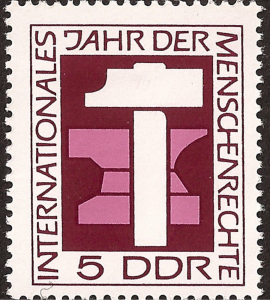
One of a number of East German postage stamps commemorating International Human Rights Year 1968. The hammer and anvil represent the right to work
The collapse of the Communist Bloc in 1989-1991 is viewed as one of the great triumphs of the human rights movement. But this ignores how socialist elites of the Eastern Bloc viewed themselves: not as the villains in the story of human rights, but as the champions.
In recent years, the rapidly expanding field of human rights history has done much to complicate triumphalist narratives of inevitable victory for Western liberal democracy over the forces of tyranny. Recent collections including those edited by Stefan-Ludwig Hoffmann, Jan Eckel and Samuel Moyn, have opened up new lines of inquiry exposing not only the contingency of these ideas, but also the conflicts amongst those claiming the mantle of universal human rights. On the Exeter University Imperial and Global History Centre blog in recent weeks, Fabian Klose has examined the important role of decolonization and post-colonial states in shaping the development of human rights politics, and Robert Brier has interrogated the idea of human rights as a product of neo-liberalism in the context of the Polish opposition. Here, I want to look beyond the human rights campaigns of dissident Eastern Europeans to that of the states they fought against.
While state socialism is normally seen as the definitional opponent of human rights – rejecting individual autonomy, independent justice, free elections, free speech and free practice of religion – the elites of the Eastern Bloc claimed that they were actually the true representatives of human rights. For them, the revolutionary victory over capitalism meant the end of class conflict and the abolition of the “exploitation of man by man.” The creation of a socialist society overcame the horrific abuses of the capitalist system, including war, imperialism and racism.
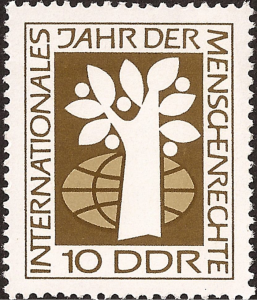
Another stamp commemorating International Human Rights Year 1968. The tree and globe represent the right to life
Eastern Bloc elites built upon Karl Marx’s denunciation of human rights rhetoric as a tool of the bourgeoisie to disguise their own class interests in the cloak of universal justice. They argued that while human rights were indeed a sham under capitalism, the socialist revolution had created a higher kind of human rights that allowed for real participation in all forms of political and economic life and achieved true equality across the class, race and gender lines. As the East German legal philosopher Karl Polak declared, “There can be no human rights without socialism!”[1]
When such rhetoric from the Eastern Bloc has been noted in histories of the Cold War, it is usually dismissed as a crude and cynical attempt to deflect Western criticism, particularly after the signing of the Helsinki Accords in 1975. That is, once the communist states were compelled to affirm the idea of human rights, they simply had to adjust their rhetoric in a desperate attempt to fend off protest from within and without.[2] These narratives are undermined, however, by the fact that state socialist elites were using the language of human rights well before Helsinki – the quote above from Karl Polak dates to 1946. In Hungary, the first scholarly work on human rights and socialism was written by legal scholar Imre Szabo in 1948.[3] As Jennifer Amos and Daniel Whelan have demonstrated, the Soviet Union was an active player in the human rights diplomacy of the 1950s. Such early efforts weren’t just rhetorical or academic: the German Democratic Republic formed the Committee for the Protection of Human Rights to campaign against abuses by the West and to mobilize citizens to campaign against the imprisonment of communists and peace activists in West Germany. Founded in 1959, this group predates the creation of Amnesty International by two years.
The 1970s are today seen as the turning point when international human rights exploded as a global movement, but at the beginning of the decade, it appeared to some observers that the West was simply outmatched by the Socialist Bloc. By 1968, the entirety of the Eastern Bloc had either signed or publically affirmed the UN’s International Covenant on Civil and Political Rights. While the United Kingdom, Italy, and West Germany did so early on, other Western countries lagged well behind with Canada signing in 1976, the USA in 1977 and France in 1980. In 1973, one observer from West Germany concluded,
With the change in majorities in the bodies of world organizations – particularly in the [UN] General Assembly – the socialist states have recognized the possibility of the politicization of human rights, and the free world has almost cleared off the field without a fight: the US by its human rights abstinence, the Western European countries by their regionalism.[4]
While the Helsinki Accords are now often portrayed as a coup for the West in “forcing” the East to accept terms that would eventually lead to its downfall, at the time, the idea of human rights was hardly seen as a devastating ideological weapon.
Including the perspective of state socialist leaders and elites is crucial to understanding human rights diplomacy in the post-war era. Such ideas and politics also were crucial to state socialist rule and influenced the development of dissident and opposition movements, as I have recently argued, along with Benjamin Nathans, Paul Betts, and Mark Smith and others. Celia Donert’s recent work similarly demonstrates how the explosion of women’s rights as human rights in 1990s can be in part traced back to the transnational feminism organized through Eastern Bloc organizations and events that have been dismissed as mere propaganda for communism. Rather than simply seeing the rise of human rights movements in the East as a direct importation from the West, this new scholarship shows how 1989 was also connected to the evolution of indigenous right cultures that were initially fostered by the state. This line of inquiry is not only valuable to the study of the Cold War and its end, but also to explaining the development of human rights politics in the post-socialist period.
In challenging liberal Western triumphalism, it is also vital to consider the perspectives of the socialist East. The appropriation of the idea of human rights by non-liberal and even dictatorial states is no relic of Cold War dynamics long since departed, but is continuing to this day in Iran and North Korea. In grappling with the developments of 1989, political scientist Peter Juliver argued that one had to begin a process of “rethinking rights without the enemy.” I would argue that in order to do so, we first must rethink the history of human rights including the “enemies,” and not just the victors.
[1] Karl Polak, “Gewaltteilung, Menschenrechte, Rechtsstaat: Begriffsformalismus und Demokratie,” Einheit 7 (December 1946): 138.
[2] For the main work asserting the discontinuous effect of Helsinki Accords for the Eastern Bloc, see Daniel Thomas, The Helsinki Effect: International Norms, Human Rights, and the Demise of Communism(Princeton UP, 2001) as well as Michael Ignatieff, Human Rights as Politics and Idolatry, University Center for Human Values series (Princeton UP, 2001), 19, which argues that the Eastern Bloc denied the validity of political and civil human rights prior to Helsinki.




